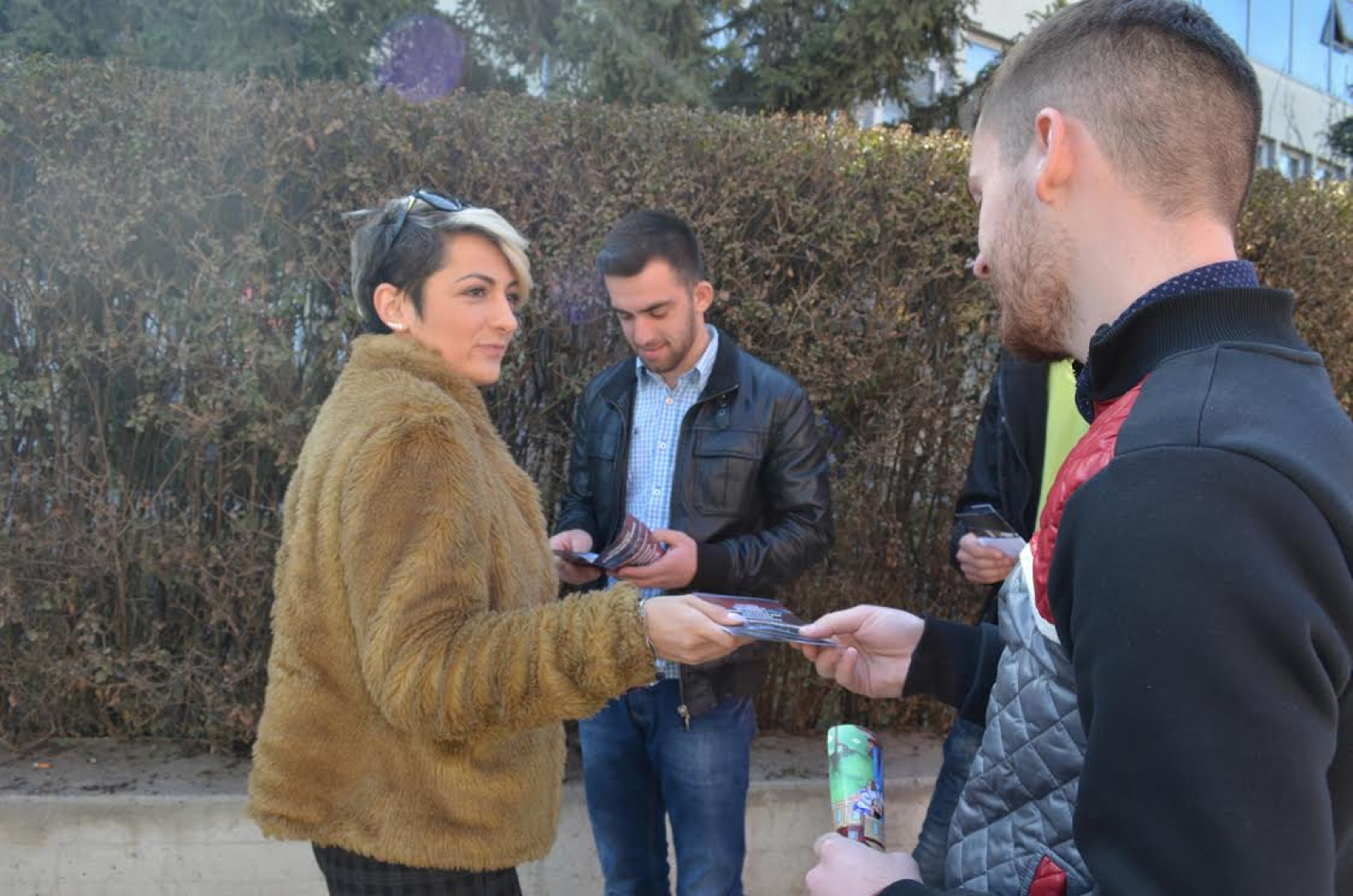
Participants organize an awareness-raising campaign in Gjilan
SHARE
A lack of government transparency affects everyone in Kosovo, fueling corruption and diminishing citizens’ trust in their government, regardless of their age, gender or ethnicity. Because Kosovo faces ongoing challenges ensuring the full inclusion of ethnic minorities in its political processes, tackling problems with government transparency requires coordinated inter-ethnic efforts, which can build open communications between ethnic groups, reduce tensions and address shared issues.
Just one example of the lack of government transparency is that government documents are often not translated into all official languages of a municipality. In Kosovo’s multiethnic society, where citizens speak different languages, the constitution and laws dictate that public documents must be provided to all citizens in their mother tongues. But minority ethnic communities are often not able to read or access government documents due to a lack of resources or political will in some municipalities to implement the law, as well as insufficient understanding of the government’s obligations.
Through a bottom-up approach, NDI supported an inter-ethnic group of political and civic youth activists from four ethnically-diverse municipalities to work together over the course of a year on strengthening municipal transparency on access to public documents. NDI provided youth activists with training and mentorship as they gained hands-on experience with issue identification, analyzing laws and regulations, conducting field research, proposing and writing policy recommendations, developing advocacy campaigns and leading effective outreach at local and central levels. Through this program, the youth leaders cultivated relationships among each other in spite of belonging to different communities, speaking different languages and/or having different political views. For many participants it was their first time meeting people from another ethnic group; some Kosovar Serb participants from the north were even visiting the capital, Pristina, for the first time.
As discussions commenced during the NDI-led training, common interests began to emerge. Initial reluctance from members of all ethnic groups - mainly Kosovar Albanians and Serbs, but also Bosniaks, Roma, and Turks – fell away, and perceptions began to change as they realized that, together, they could have a greater impact on decision-making processes. Participants worked together in their respective municipalities to research obstacles to government transparency, develop and advocate for recommendations to increase transparency, and raise public awareness about their rights to public information. These activities helped them “walk in each other’s shoes” and see each other’s problems in a new way while embracing their differences.
One of the municipalities consulted the youth on a draft transparency regulation to incorporate their recommendations, including holding weekly citizen meetings with the mayor. Following another group’s recommendation, a second municipality appointed an officer to ensure public access to information, engaging a group participant for the position as she was already familiar with the municipality’s obligations to citizens regarding government transparency.
Through this program and with the help of NDI, we have been able to establish great cooperation with local institutions. It’s a great feeling of empowerment when you see that they have listened, incorporated one of our recommendations and are willing to further cooperate. This is just a start as we know some things cannot change overnight.
- Serbian participant
The highlight of this program was a much anticipated national roundtable held in April 2017 in the National Assembly, which crowned the accomplishments of the program and gathered governing officials from different communities. The youth were able to meet their representatives, share their recommendations, and, most importantly, gain recognition of significant hurdles in government transparency and ways to address them.
A member of parliament declared: "Transparency and accountability is unfortunately lacking in Kosovo, not only on the local level but also on the central level. The Ministry of Local Government needs to take responsibility in better monitoring the municipalities, and urgently demand that all municipalities publish all public documents on their websites."
The inter-ethnic diversity of the participants and the representatives enriched the debate and helped individuals think about problems beyond themselves and their respective community, resulting in a fuller consideration of the various needs of different communities for government transparency and more inclusive and responsive government.
Participants present their recommendations to members of parliament and local government representatives in the Kosovo Assembly.
This program was made possible through funding from the National Endowment for Democracy.



